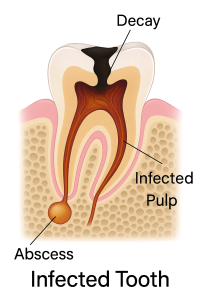
What is an Dental Abscess?
What is a Dental Abscess?
Maybe you’ve heard the term abscess, and thought what is a dental abscess? Well, it’s not a term most people like to hear, but finding relief is something you’ll have immediately after you are treated. An abscess can form along the gum line or at the base of a tooth. It is a swelling of an infected area that is filled with bacteria (pus).
Causes of A Dental Abscess
The root cause can be from several factors:
- Poor diet-diets high in sugar and low in nutrition (think the Standard American Diet), puts you at risk for inflammation and infection. Eat less processed foods and more whole food plants to decrease inflammation
- Poor dental hygiene: abscesses are caused by a collection of bacteria. By properly brushing twice and flossing one a day, you help rid the mouth of harmful bacteria.
Symptoms of an abscess:
- The swelling leads to pain, discomfort
- Foul smell from mouth
- Can even produce a fever. It’s your body’s way of dealing with an infection.
There are 3 types of abscesses:
- Periapical abscess: the most common cause for needing a root canal. Here the tooth becomes infected through the pulp (interior) of the tooth. This can occur if there is a crack in the tooth, making it easy for bacteria to enter the tooth. The infection travels and becomes rooted at the base of the tooth, connecting to the nerves. This causes discomfort/pain.

- Gingival abscess: impacts just the gum line. Think of the abscess like a pimple. It’s an area where pus-filled bacteria collects. To rid the body of this pain and infection, you will need to be seen by our dental team. Your dentist will excise and drain the infection, and there will be immediate relief from the infection.
- Periodontal abscess: a more severe form of a gingival abscess. This is common in patients who have periodontal disease. When the gum tissue becomes inflamed, the gum separates from the tooth, creating pockets that are perfect hiding places for dirt and bacteria. Much like a gingival abscess, this impacts the gum, but also penetrates to the bone structure surrounding the tooth.
In all three types of dental abscesses, your dentist needs to treat the infection. If left untreated, permanent damage can occur to the bone and can lead to dangerous cardiac infections. In some incidences your dentist at Altman Dental may prescribe an antibiotic to treat the infection and prevent its spread in your system.
For a link to information from the Mayo Clinic, click here.